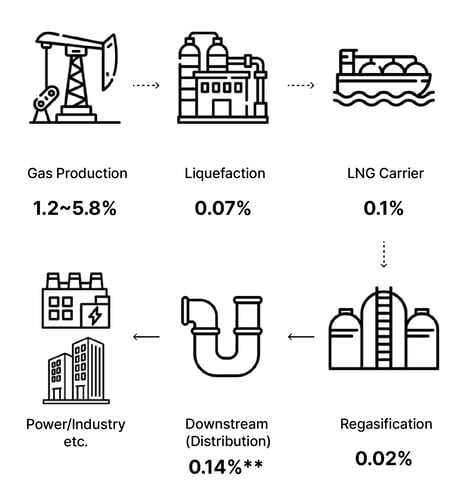About
SFOC's Industry Trends Brief examines domestic and international trends related to industrial decarbonization including iron and steel, methane, and shipping, and explores ways for both industry and the natural environment to thrive.
Table of Contents:
1. Beyond CO2: Unmasking Methane as the Hidden Climate Change Culprit
2. Methane Leakage Across the Gas Industry Value Chain
3. The Costs of Methane Leakage
4. Methane Mitigation Measures for the Gas Industry
5. Recommendations
Industry Trends Brief No.2
Despite South Korea's membership in the Global Methane Pledge (GMP), the Korean energy sector has yet to thoroughly address methane emissions - a potent greenhouse gas which significantly contributes to near-term climate change. Methane is emitted throughout the entire gas industry value chain, from gas exploration, production to transportation and distribution.

It is important to highlight that current estimates for methane do not account for methane emissions linked to the production and import of LNG from overseas, which is notable given that South Korea ranks among the top three LNG importers globally. Additionally, emissions are expected to rise if the estimates take into consideration the overseas oil and gas production sites currently being developed by South Korean energy suppliers.
The economic impact of methane leaks from gas upstream and downstream sectors are estimated to be significant and should be addressed not just as individual corporate profit loss but as a national energy efficiency issue.
The gas industry can curb methane emissions by improving leakage control such as leak detection and repair (LDAR) programs and by adopting global reduction initiatives, with governmental policy support playing a crucial role. In the policy landscape, it is also crucial that the South Korean government establish guidelines designed to reduce methane emissions, given their significant climate impact and economic value.
The current lack of effective systems for measuring and monitoring methane emissions requires the government to develop reliable standards for measuring, reporting, and verifying (MRV) methane emissions. These standards will enhance the gas industry’s effectiveness in reducing methane emissions and create a transparent methane inventory system.
Drawing inspiration from European Union’s legislative efforts to prepare a system that sources gas with lower methane emissions, South Korea can also develop regulatory frameworks that encourage collaboration with gas producers. This would enhance joint methane reduction initiatives across the entire value chain.


